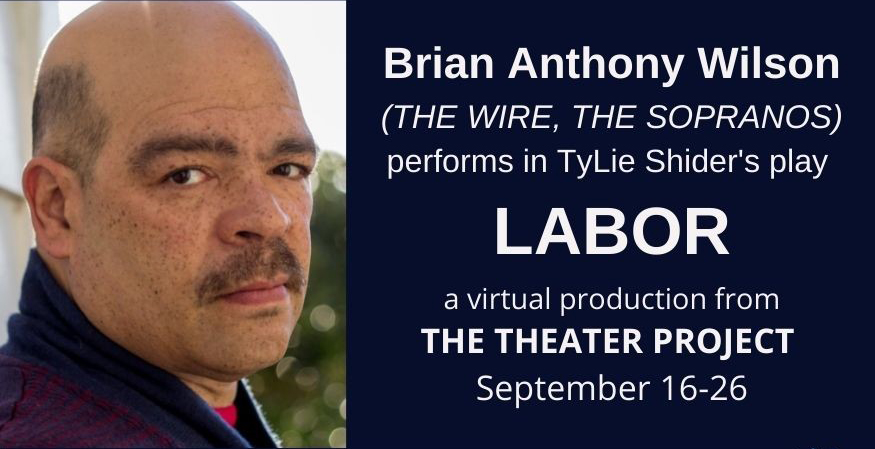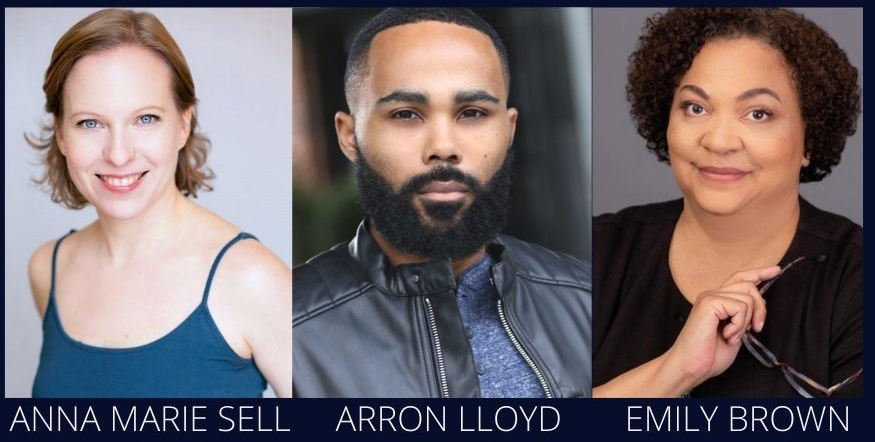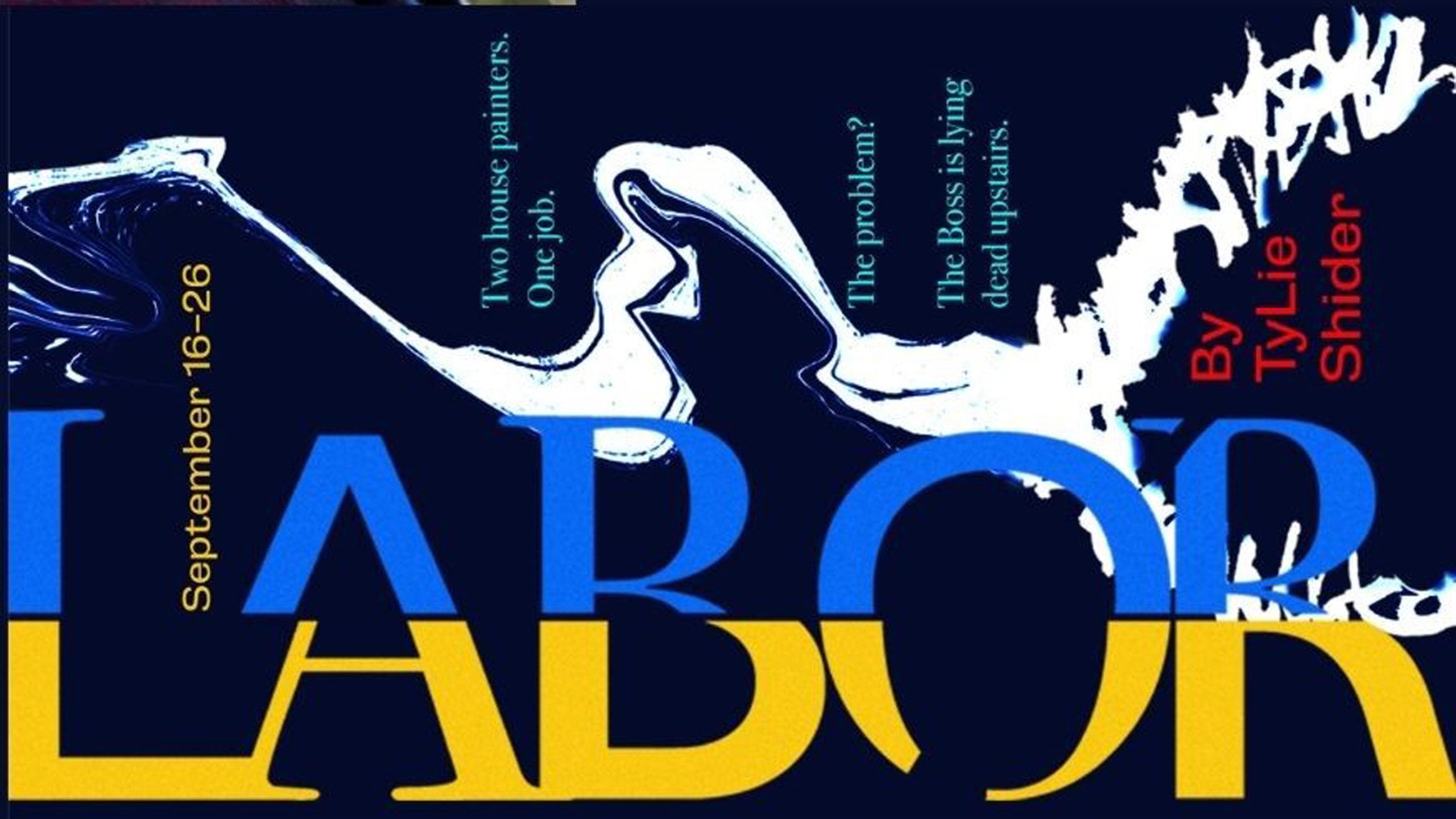John looks at Ryan with a kind of unimpressed skepticism. He has never heard of a “survival job,” as Ryan calls it, the kind of work someone takes until something better comes along. John has only ever heard of having a job in order to survive. That, to John, is the whole point of a job.
This opening difference of perspectives lays out the clear mindsets of two main characters from past R&D Group member Tylie Shider’s dark comedy, LABOR, which was recently produced virtually complete with some special visual effects by The Theater Project. John, an older man who works as a painter despite the pains of an aging body played by Brian Anthony Wilson, has a straightforward approach to labor: you do your job, you do it well, you earn your money, you act honestly, and you trust the boss to pay you at the end. For Ryan, the young man played by Arron Lloyd that John has taken on to help, work is about getting paid, finding ways to make more profit, and not trusting the boss to do the honest thing.

The play opens with John and Ryan beginning their workday on a job painting the home office in a historied house by an owner who is never seen or heard. Left on their own in the room as they work, the two debate back and forth on a variety of topics. Contrasting with his by-the-book approach to work and splash of idealism about the dynamics between worker and boss is his rather stubborn and jaded personality. Single, middle-aged, and suffering from back pain, John is a man who keeps his head down and his nose clean while full of regrets and anger. He opens up to Ryan about his past and his current struggles until reaching a self-awareness of his vulnerability that prompts his gruff exterior to slide back into place.
Ryan, who is always trying to find a way to get ahead, has a much sunnier and more optimistic demeanor. His ambitions come to light in the greater philosophical debates with John along with more vulnerable moments such as when he puts on the boss’s blazer, pretending to be the president of the United States, and when he opens out about getting kicked out for stealing from his mother. In his fantasies of being president, we are presented with Obama-like speech snippets about race relations and neighborly respect in the United States, touchpoints to undercurrents to the abstract exploration of labor that grounds the debates further alongside the personal experiences of the characters. The undercurrents continue subtly throughout the play with Ryan often at the center from his comment about “bosses and masters” to his use of “ma’am” in the second act when speaking to Mary, a white woman who also works for the owner of the house. He also reads Richard Wright’s Native Son and attempts to explain it to John who has not read it.

The layers of generational tension and personal revelations that unfold throughout the first act of the play develop a complex profile of how labor is defined and valued, its role in day-to-day life and an overarching pursuit of The American Dream, the tangible and intangible costs of labor, and the effects of power dynamics on work relationships. The philosophical exploration comes naturally embedded within the kinds of interactions between coworkers which immediately feel familiar rather than being heavy-handed. After all, LABOR is still a dark comedy.
Remember that boss, the owner of the house, who’s always offstage? His name is Mr. Dalton, and towards the end of the first act after all the painting has been finished, Ryan finds him dead upstairs when trying to collect on payment.

Ryan sees opportunity where John sees a quick way to get into trouble. The work day has finished, the boss is dead, and John wants to keep his hands clean and go home. He urges Ryan to do the same. The second act gives us new characters and, subsequently, more forms of and perspectives on labor to consider. Peggy, a cleaning lady employed by Mr. Dalton played by Emily Brown, shows up to the house and proceeds to do her work. She collects her payment from Ryan, disguised as Mr. Dalton’s British accountant “John,” and catches on that Ryan is not who he says he is. But, she gets her payment and carries on with her day, happy enough to have received her due plus some. Peggy leaves an impression, taking a kind of balance point between John and Ryan despite her rather short time onstage. She does her work, keeps her head down, and takes what she is owed while not asking questions because it works out to her benefit.
After Peggy, Mary arrives to deliver Mr. Dalton’s tenants’ rent checks and complaints. Played by Anna Marie Sell, the intense, energetic, and suspicious Mary meets Ryan, who pretends to be Mr. Dalton’s driver this time, trying to haul a trunk out the door. You can likely guess what is in the trunk. As the plot unfolds in surprising, dark, and hilarious ways, we gain insight into what Mary feels her work has cost her and what she has earned, how far John will stick to his ethics, and where Ryan’s impulsiveness gets him. All that is left is Peggy.

Tylie’s philosophical exploration wrapped up in a dark comedy complete with death, murder, theft, and conspiracy provides entertainment as well as food for thought. In a talkback after the show, Tylie shared how this play has been a project of his since graduating school, after which he took a series of tip jobs. During those tip jobs, he conducted informal interviews with coworkers and developed a kind of foundation for his desire to explore the dramatic arc of a workday and both the intergenerational tension and surprising vulnerability that exists between coworkers. From this starting point, the play developed into its current form which director Mark Spina shared in the talkback as asking “what is the American Dream?” Tylie offers us what the American Dream might mean to his characters and leaves his audience to consider the offerings, to continue asking the question, to interrogate the concept, and to act about who has access to it.
Though this play has been produced in previous iterations, and likely will be produced in new forms in the future, the exploration of labor within it resonates with its virtual production context. During the talkback, Arron Lloyd shared his excitement about the innovation possible with virtual theater as a new medium and the access it opens up for both audiences and actors. With virtual theater, not only can audiences watch a show anywhere, but the cast and crew do not have to be in a central theatrical hub like New York City to be hired. Emily Brown shared similar sentiments and credited this production’s virtual nature with the opportunity to work with this cast and crew. These reflections come at a time when we as a society and individually are reassessing our relationships to labor as some of us make choices about working remotely or returning to in-person environments and others have no choices and are expected to adjust to either without a say. For all the ways the play can spark a resonance with audiences, its absurd moments of comedy and black humor lift its audiences at a time when a laugh could do us all some good.
Extended Play is a project of The Civilians.To learn more about The Civilians and to access exclusive discounts to shows, visit us and join our email list at TheCivilians.org.
Author
-

Leah Putnam (she/her) is a dramaturg from outside of Philadelphia, Pennsylvania. Prior to joining The Civilians, she worked as a dramaturg for Live Arts in Charlottesville, Virginia and has worked on developing new work with writers including LET GO OF ME by Kelley Van Dilla. She is particularly passionate about immersive theater and also has a background in costumes. Leah completed her MA in English at UVA and her BA in English at NYU.
View all posts









